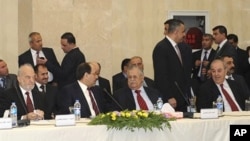Iraq's rival political leaders are meeting in the northern Kurdish city of Irbil in an attempt to agree on a power-sharing arrangement that would end an eight-month power vacuum in the country.
Kurdish regional President Masoud Barzani welcomed Prime Minister Nouri al-Maliki and former prime minister Ayad Allawi to Irbil for talks aimed at forming a government.
Barzani called the meeting a milestone moment, but the current and former prime ministers showed few indications they are ready to agree to any deal.
A number of political analysts conceded the big push was to pressure former prime minister Allawi to accept the post of parliament speaker, rather than that of president or prime minister. Outgoing prime minister Maliki and his spokesman said during the weekend that he has the votes to retain his job in a new government.
At the Irbil conference, Mr. Maliki spoke of national reconciliation.
He says Iraq needs national reconciliation because terrorism and other ignorant policies of the past almost created a sectarian conflict between Iraq's religious an ethnic groups. National reconciliation, he insists, is a lifeboat to put an end to artificial divisions among Iraqis. The participation of all Iraqis, he concludes, is in Iraq's supreme national interest.
Allawi, whose Sunni-backed Iraqiya alliance edged out Maliki's State of Law bloc in parliamentary elections in March, made no reference at the conference to conceding.
He says he and his party envision an authentic national participation, which is equal and balanced and includes all of Iraq's various components. He says a force is needed inside the political system that would be neutral and arbitrate among different factions, so that power is divided equally.
Iraqi Shi'ite leader Ammar Hakim urged his fellow leaders to compromise and cooperate in order to find a way out of the political impass.
He says that each party must gain something and give something else up in favor of others, in addition to accepting them as partners and understanding their opinions and concerns.
Iraq's parliament is due to meet some time later this week in order to elect a new president, prime minister and speaker of the assembly. It remains to be seen if it will be possible to do so.
Meanwhile, an explosion near the shrine of Imam Ali in the Shi'ite holy city of Najaf caused a number of casualties. It followed a separate blast in the Shi'ite town of Karbala, earlier. Violence appears to be mounting across Iraq, amid the country's ongoing political vacuum.
Rival Iraqi Leaders Hold Meeting to Divide Power




